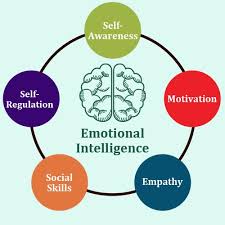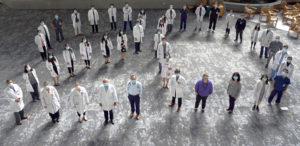September 11th, 2020
Emotional Intelligence During a Pandemic
Masood Pasha Syed, MBBS
“We are the keepers of each other’s future,” my program director said in her speech on our graduation day. These words have resonated in my mind and inspired me in laying the foundation for my chief residency year. We all have the opportunity and responsibility to teach and learn from each other. I remember the first day of my internship, where I felt like a sponge trying to adsorb or absorb as much as I could. And here we are, 3 years later, ready to take the reins — some of us as attendings, some as fellows, and, a few of us, as chiefs.
Living in a world with COVID-19, one can’t help but wonder what this means to the new residents and medical students stepping into medicine. Medicine never was and never will be an easy science. As residents and medical students go through training this year, learning to truly appreciate and internalize what it means to be on the frontlines will be a unique experience. Although there is a formal curriculum for residents and medical students, which is absolutely needed, we also must be mindful about giving our residents the best tools to work through the pandemic. One such tool is emotional intelligence (EI).
Emotional intelligence is the capability of individuals to recognize their own emotions and those of others, discern between different feelings, and use those feelings to guide behavior to achieve one’s goal(s). There is growing research and evidence that a doctor’s EI can influence his or her ability to deliver meaningful and compassionate patient care. But is EI is a trait we are born with or a learned skill that we acquire? I think it is a combination of both. Through this pandemic, I have found that we, as a medical community, are developing a stronger sense of emotional intelligence. To highlight this, consider the ‘Mixed Model Theory’ by the journalist/scientist Daniel Goleman which endorses five key elements that lay the foundation for EI: motivation, self-awareness, self-regulation, empathy, and social skills. I want to share this theory through medical binoculars with illustrations that I believe might help us become better physicians.
Defining emotional intelligence through the pandemic:
- Motivation – the ability to go on in life, despite obstacles or limitations one may have. One big concern we had earlier this year was the new interns’ experience as they were about to start training. Would they be able to start residency training on time? Could medical graduates travel nationally and internationally to their matched programs to train? Would their learning be compromised as we innovated through the pandemic (while socially distancing ourselves)? It takes motivation and commitment to leave everything and everyone in your life at home and move to a new location or country to train and work during a pandemic. Our program is diverse, with residents from 14 countries on 5 continents, which means that we must work within all those countries’ rules and regulations to have our interns join us this year. As we traversed through varying timelines in getting our residents to our program, we learned from all their experiences and journeys. I appreciated our interns’ motivation and dedication as they successfully began their training this past summer.
- Self-awareness – the ability to recognize one’s moods, feelings, skills, and limitations. Being self-aware is essential, as this also has an effect on our patients and the care we deliver. Going through the pandemic with a surging number of cases and losing patients to this illness warrants reflective debriefing and addressing one’s own feelings associated with it. Self-awareness is vital to reduce physician burnout while maintaining hope and optimism and seeing the light at the end of this tunnel.
- Self-regulation – the ability to use self-awareness to control one’s own impulses and recognize our impulses while caring for our patients. This pandemic brought with it limited visiting rights, which meant families could not meet their loved ones who were in the hospital. This regulation usually was met with understanding, occasionally with grief, and rarely with anger. Self-regulation for a healthcare provider in this setting means controlling one ’s response to this challenging situation and advocating the importance of social distancing in keeping family members safe.
- Empathy – “going the extra mile” is the ability to understand other people’s emotions and reactions. Being motivated and self-aware while regulating one’s own emotions allows one to be an empathetic physician. Through this pandemic, I have realized the power our words and actions genuinely have. Whether it was using your phone to Facetime patients’ family members to allow them to see their loved ones in the hospital, covering for your colleague who may be sick, or staying beyond your shift time to stabilize your ill patient — there have been numerous examples of nurses and residents going the extra mile. I cannot do justice to all their efforts and sacrifices, many of which go unnoticed. I am reminded of the following quote: “People will forget what you said, people will forget what you did, but people will never forget how you made them feel.” – Maya Angelou
- Social skills – the ability to pick up social cues during our interaction, as we find common ground with others. Being socially inclusive while socially distancing has been a new way of life. The key has been to consistently innovate to supplement our lives through the pandemic for our education, learning, and social wellness. As an example, we have a wall in our department where we mount an annual picture of all our residents with the program leadership. This year might have been the first in which we would not have a group picture of all our residents. We had to innovate, while practicing social distancing — which resulted in what I think is the most exceptional picture of all time.
Our actions are a product of our mindset and ever-evolving perspective. Working through this pandemic has most definitely changed our perspective about caring for our patients and each other. As a chief resident, it is my honor to witness my residents’ and interns’ tremendous growth through training. Helping students find their true calling and meaning in their work is a rewarding experience for every educator. One such example for me is this poem penned by my intern, Dr. Vishesh Jain, as he worked through the pandemic and wrote about what it truly meant to him.
In conclusion, I appreciate all my colleagues (physicians, residents, nurses, nutritionists, physical/occupational therapists, case managers, EMTs, PCAs, other frontline workers) preparedness to show up to work — be it during a pandemic or not, no questions asked, no less heroic than soldiers walking into war. During these times, emotional intelligence is vital, as it adds meaning to our lives and helps reduce healthcare worker burnout while allowing them to provide the best patient care. As we continue to care for our patients, not knowing the long-term complications of this disease, we must not forget our power as healers. One cannot cure every ailment, but perhaps one can help heal it.







The need for emotional intelligence is paramount at these times. It is not only to take care of our patients but also of one another at these trying times.
Thank you, Sandeep. I agree with you.
Masood, this post was a great reminder of the humanistic side of medicine that has helped us get through the pandemic so far. Two aspects you mentioned stood out to me – self-awareness and self-regulation. These are the aspects I have seen evolve the most (in myself, peers, and junior residents) as residents mature over the course of residency.
Thank you, Vivek. I am glad you have noticed the evolution of emotional intelligence in yourself and your residents through the pandemic. Patience and understanding as you pointed out in your post will also help us be mindful of the lessons we continue to learn and the strength we continue to acquire.
I felt strongly connected to the quote “People will forget what you said, people will forget what you did, but people will never forget how you made them feel.”
Very well thought and framed.
Good luck for the fellowship Masood!
I am am very proud and honored to work beside you as well as all the heroic co-workers.I live by these 5 everyday .Very good article ,from one the most compassionate,caring human beings that I know .
Thank you, Tim, for your warm and kind words. We enjoy working with you and thank you for being involved in resident education. You are constantly helping in educating these heroic co-workers and we truly appreciate it.
Dheera, I am glad you could connect to the mentioned quote. It is essential that we find meaning in what we do and it is what keeps us going on challenging days,
Thank you, Dheera, for your wishes. Good luck to you too.
Very well written, Masood! We have a program within our residency that helps us build EI. Residents enjoy it to varying degrees, but I find that having the dedicated time for self-awareness and learn about each other’s self-reflection builds empathy and resilience, even prior to pandemic times.
Thank you, Stephanie. I agree with you – dedicated/protected time is important and hard to find amidst our busy lives but that is what truly adds meaning to all that we do.
I am scheduled to participate in a PodCast in December regarding the incorporation. of Emotional Intelligence into Psychiatric Social Work practice. I will share this powerful post with those in attendance. I will also share it now with my linked in connections and groups.
I am an advocate for Emotioonal Intelligence throughout the life cycle.
Thank you, George, for sharing this very important yet highly ignored component of our training and practice in your podcast. We definitely need more advocates like yourself in mainstream society and various careers.